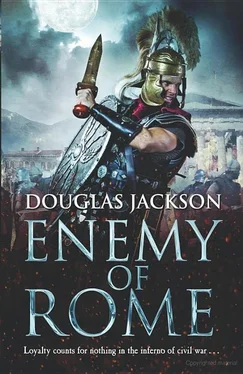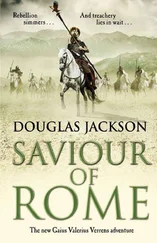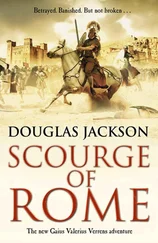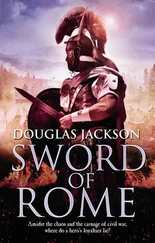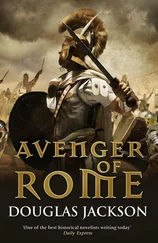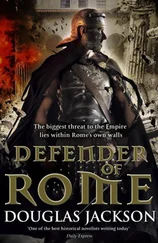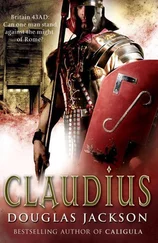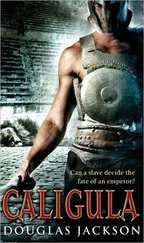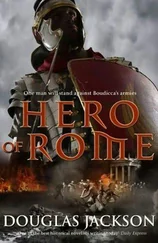Douglas Jackson - Enemy of Rome
Здесь есть возможность читать онлайн «Douglas Jackson - Enemy of Rome» весь текст электронной книги совершенно бесплатно (целиком полную версию без сокращений). В некоторых случаях можно слушать аудио, скачать через торрент в формате fb2 и присутствует краткое содержание. Год выпуска: 2014, ISBN: 2014, Издательство: Bantam Press, Жанр: Исторические приключения, на английском языке. Описание произведения, (предисловие) а так же отзывы посетителей доступны на портале библиотеки ЛибКат.
- Название:Enemy of Rome
- Автор:
- Издательство:Bantam Press
- Жанр:
- Год:2014
- ISBN:9781448127696
- Рейтинг книги:4 / 5. Голосов: 1
-
Избранное:Добавить в избранное
- Отзывы:
-
Ваша оценка:
- 80
- 1
- 2
- 3
- 4
- 5
Enemy of Rome: краткое содержание, описание и аннотация
Предлагаем к чтению аннотацию, описание, краткое содержание или предисловие (зависит от того, что написал сам автор книги «Enemy of Rome»). Если вы не нашли необходимую информацию о книге — напишите в комментариях, мы постараемся отыскать её.
Enemy of Rome — читать онлайн бесплатно полную книгу (весь текст) целиком
Ниже представлен текст книги, разбитый по страницам. Система сохранения места последней прочитанной страницы, позволяет с удобством читать онлайн бесплатно книгу «Enemy of Rome», без необходимости каждый раз заново искать на чём Вы остановились. Поставьте закладку, и сможете в любой момент перейти на страницу, на которой закончили чтение.
Интервал:
Закладка:
Douglas Jackson
Enemy of Rome
Once before, the Capitol had been consumed, but then only through the crime of individuals; now it was openly besieged, and openly set on fire.
Cornelius Tacitus, The HistoriesI
Western Pannonia, August, AD 69
‘You are sentenced to death.’
The verdict sent a jolt through Gaius Valerius Verrens as if he’d been drenched in ice melt. All the air seemed to be sucked from the sweltering tent and the three officers facing him behind the rickety campaign table shimmered like a desert mirage. In the centre, Vedius Aquila, commander of the Thirteenth legion, continued to outline the prisoner’s crimes. Valerius could see his lips moving, but their meaning was lost in the void between. This couldn’t be happening.
The civil war that had torn the Roman Empire apart since the death of Servius Sulpicius Galba almost nine months earlier should have been over. Galba’s murderer, Otho, was dead, his army defeated on the damp plain between Cremona and Bedriacum by forces loyal to the governor of Germania, Aulus Vitellius. Now Vitellius sat on a golden throne wearing an Emperor’s cloak and an Emperor’s laurels, his position confirmed by the Senate and people of Rome. Division, deception and the betrayal of old loyalties are the very stuff of civil war. Valerius Verrens counted Vitellius as his friend, but he’d fought for Otho at Bedriacum, as deputy commander of the First Adiutrix legion. He’d watched the First fight like champions, but its cohorts had been annihilated when the army’s left wing collapsed. An eagle was won, but the First’s eagle had been lost, and the loss of an eagle was the loss of a legion’s pride, its honour and its soul. Valerius somehow escaped the final massacre, only to discover that another man now disputed Vitellius’s claim to the throne. That man was Titus Flavius Vespasian, proconsul of Judaea, whose Egyptian and Syrian legions, preceded by a vanguard from Moesia and Pannonia, were now marching on northern Italia.
After Bedriacum, Valerius, branded a traitor to Rome, fled east to join Vespasian’s forces. Bearded, stinking and looking more like a one-handed goatherd than a holder of the Corona Aurea, he’d been arrested as a deserter by the first soldiers he’d encountered. When Aquila had recognized him, Valerius believed his ordeal was over. Instead, it was just beginning.
‘… you are stripped of your honours, your rank and your possessions. Be thankful that I give you a soldier’s death, rather than the coward’s you deserve.’
‘It is not true. I-’
‘Silence.’ Valerius clamped his lower lip between his teeth and drew himself up to his full height as Aquila continued. ‘You will be taken from this place and paraded before the leading cohorts of this army to your execution.’
Strong hands pinned Valerius’s arms to his sides, but he shrugged them away. ‘There is no need to bind me,’ he snapped. ‘I am not afraid to die like a soldier.’ He met Aquila’s stare, and the men holding him relaxed as the legate nodded. Valerius continued to hold his gaze. ‘This is wrong, general. I hope you can live with it.’
The narrow, almost skeletal features froze, but Aquila’s expression remained implacable. ‘Take him away,’ he said tersely.
They emerged into the sunshine, and the summer heat of Pannonia struck Valerius like a blacksmith’s hammer. He blinked as his eyes struggled to adapt to the change from gloom to searing brightness. When they cleared he wondered how it was that, when a man’s life could be counted in moments, every image seemed so sharp, every colour so vivid, deep and intense. He hesitated, taking a deep breath, but a hand shoved him roughly in the back and sent him staggering towards the open square, where two thousand men waited to see him die. His left hand instinctively went to his throat, but the gold charm had been taken when he was captured. At least they had dressed him in a clean tunic and allowed him to shave, so men could see him for what he was: a knight of Rome. A member of the senatorial class that had ruled long before Augustus proclaimed himself Emperor. More important, they had left him the carved wooden fist that was as much part of him as the original, now a pile of mouldering bones lying in the burned-out ruins of a British villa.
That memory strengthened his resolve and he raised his eyes so as not to miss a moment of what was to come. This was meant to be a humiliation — the shaming of a coward and a deserter. Yet he felt their gaze on him and he knew they were seeing a soldier. A tall man, his gaunt features scarred by battle and more wounds hidden beneath the crow-dark hair; eyes filled with defiance burning from a face marked by sorrow and loss. Gaius Valerius Verrens was not afraid to die. He had faced death many times: in the smoke-filled darkness of the Temple of Claudius; on the dusty golden plains of Armenia; and, more recently, on the blood-soaked sands of the arena at Cremona, where another man’s sword had carved him open. He had known triumph and defeat. He could face disaster. But he would not feel shame.
The four guards steered him up the first leg of the square and he recognized the roaring lion symbol of the Seventh Claudia on the line of shields. Campaign-hardened faces stared out at him from beneath polished iron helmets, their expressions varying from tense to bored. These men were veterans; they had better things to do than stand in the sun and watch a stranger die. A few showed sympathy, and some of the younger eyes glittered with anticipation. These would be the newer recruits, soldiers who had not yet witnessed the lake of blood a man couldn’t avoid during a lifetime marching behind the eagle. Valerius was surprised at how little he felt on this day of his death. A hollow emptiness inside. A slight numbness of the mind. A tickle at the neck in anticipation of …
He pushed the thought to the back of his mind and concentrated on the faces of all the friends who had preceded him on this journey: Falco, commander of the Colonia militia, who sacrificed himself and his men to delay Boudicca a few more hours; Maeve, the Trinovante girl who had loved, then betrayed him; Lunaris, defender to the last at the door of the Temple of Claudius, and Messor who risked his life in vain in the tunnels below. Marcus, the old lanista , who led his gladiator cohort to its death at Bedriacum, and Juva, the big Nubian who captured an eagle there. All gone. All sacrificed to Mars. Why should Gaius Valerius Verrens be any different?
His eyes drifted to a cloudless blue sky marred only by three black specks circling lazily over the distant hills. The sound of buzzing insects filled the air and the occasional chink of metal on metal drew a hissed rebuke from a centurion. A new shield, and another lion, but this time with the rays of the sun shining from its maned head. The symbol of the Thirteenth, who had fought on the right flank at Bedriacum, led by the man who had condemned him. Vedius Aquila believed he had been betrayed, not defeated, and these men were desperate for another chance to show they could fight. Their commander had been reprieved, but their most senior centurions were executed in the aftermath of the battle on the orders of Vitellius. Aquila felt the shame of Bedriacum more deeply than any man, and he blamed the First Adiutrix for breaking. The First’s legate had died in the battle, but not before Valerius’s unorthodox tactics had gained him the enemy eagle captured by Juva. They might have won the day if he’d been supported. But Aquila, an old-fashioned commander, blamed Valerius’s impetuous tricks for the defeat, and believed he had abandoned his men. That wasn’t true, but it didn’t matter now.
Читать дальшеИнтервал:
Закладка:
Похожие книги на «Enemy of Rome»
Представляем Вашему вниманию похожие книги на «Enemy of Rome» списком для выбора. Мы отобрали схожую по названию и смыслу литературу в надежде предоставить читателям больше вариантов отыскать новые, интересные, ещё непрочитанные произведения.
Обсуждение, отзывы о книге «Enemy of Rome» и просто собственные мнения читателей. Оставьте ваши комментарии, напишите, что Вы думаете о произведении, его смысле или главных героях. Укажите что конкретно понравилось, а что нет, и почему Вы так считаете.
